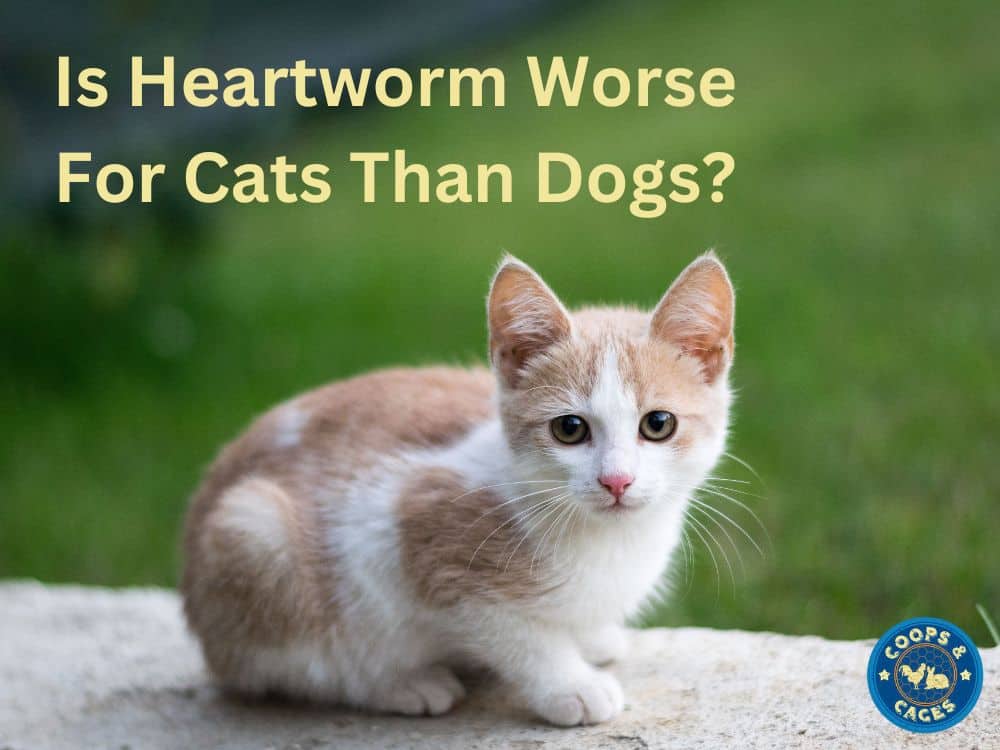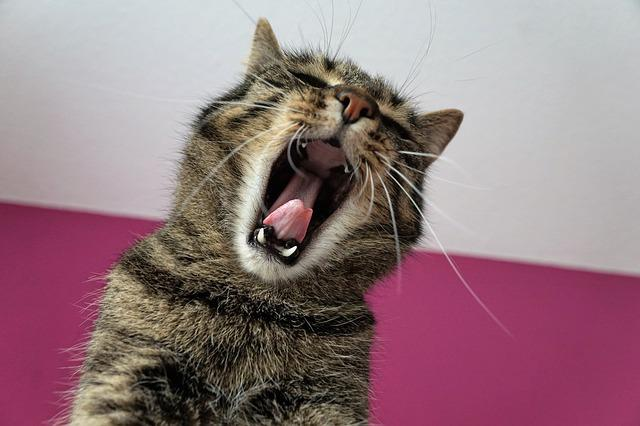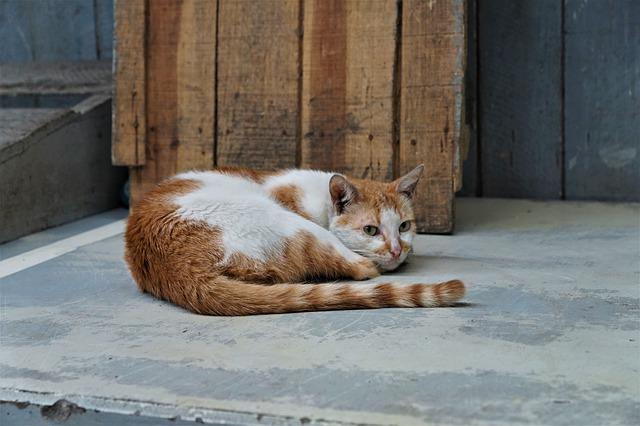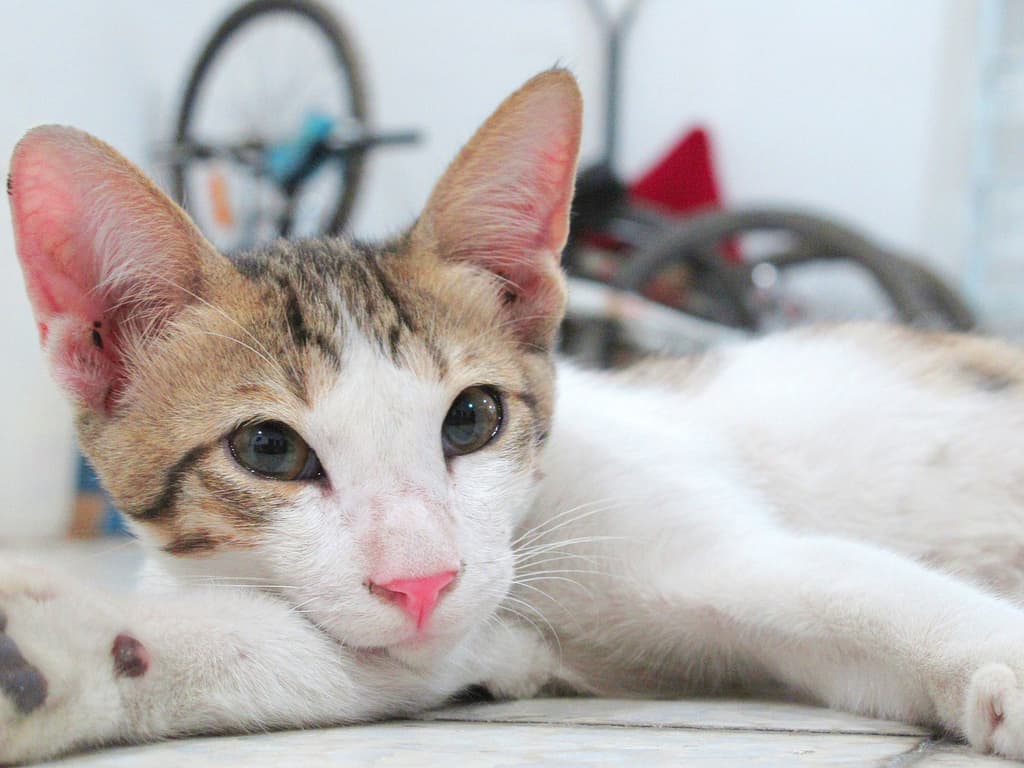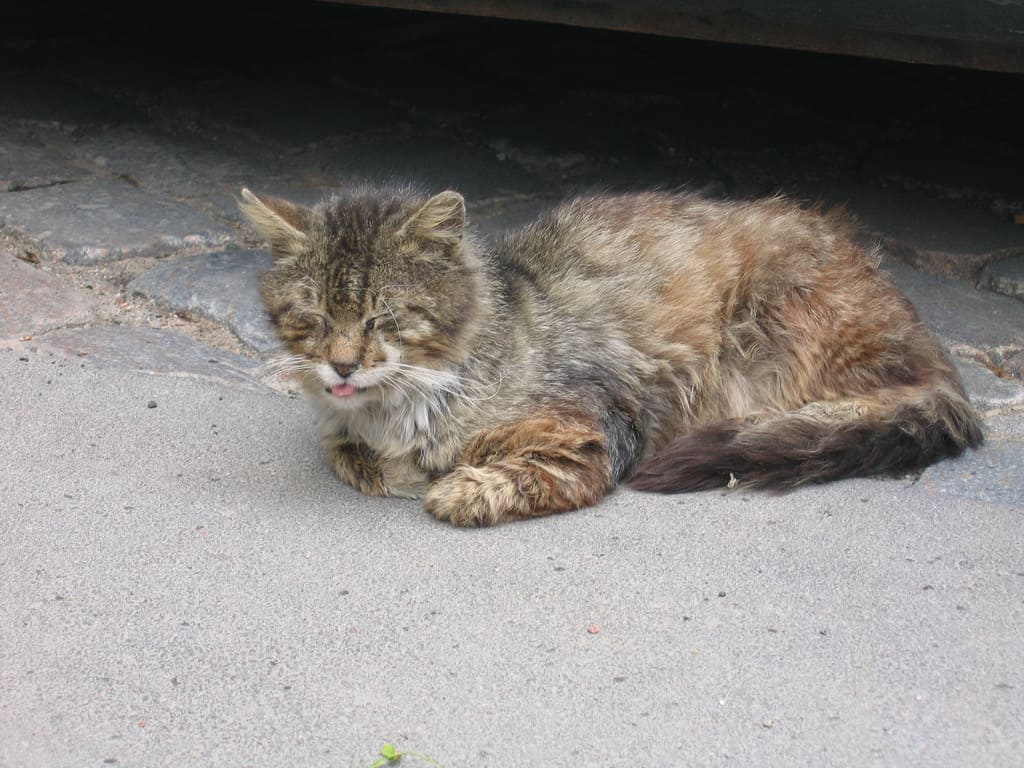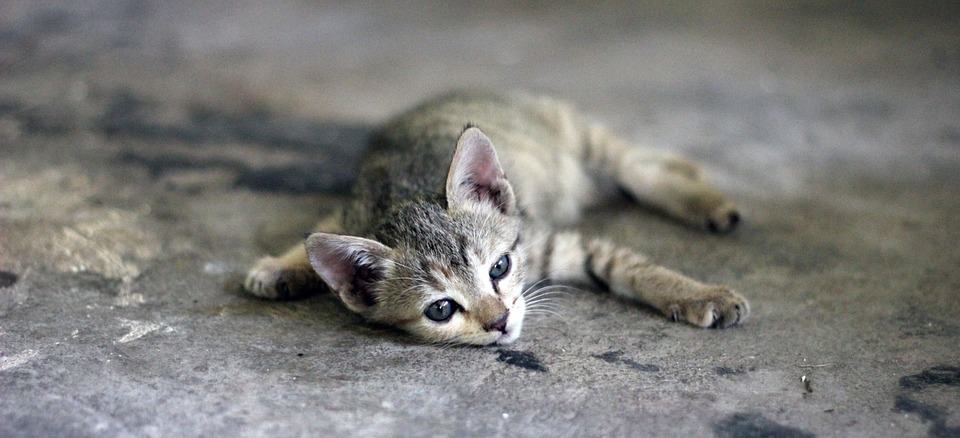Pet owners need to be aware of the dangers of heartworm disease. Heartworm is a serious and potentially fatal disease that pets can get from an infected mosquito.
Although it’s most often found in dogs, cats can also contract heartworm disease.
In this blog post, we’ll discuss the symptoms of heartworm in infected cats, how to prevent heartworms, and what treatment options are available for heartworm positive cats. So keep reading to learn more!
What Is Heartworm Disease
Heartworm disease is a very serious disease in cats where they become infected with a parasitic worm known as a ‘heartworm’.
The parasite gets into your cat’s body and lives inside their heart, lungs, pulmonary arteries or associated blood vessels.
Adult heartworms can grow up to 30cm long and look like white angel hair pasta. Heartworm larvae (called microfilariae) are the baby worms and are too small to be seen without a microscope.
Heartworm is commonly found in domestic cats, dogs and ferrets. It can also be found in wild animals such as wolves, foxes and sea lions. While it is rare, humans can also get heartworm.
What Causes Heartworm Infection?
Infected mosquito bites are the primary cause of heartworm.
When an infected animal with heartworm (most commonly an infected dog) is bitten by a mosquito, the mosquito can pick up infective larvae from the animal’s blood.
When the infected mosquito then bites the next animal, these infective larvae are deposited under the skin. They then move into the blood vessels or pulmonary arteries and begin to grow.
It typically takes immature heartworm larvae six months to mature into adult heartworms.
Cats affected by heartworm disease will typically have 1-3 adult heartworms. In comparison, a dog infected with heartworm disease usually has 15 adult worms.
After the initial mosquito bite, adult worms can survive for up to three years inside of a cat.
Risk Factors
All cats are at risk of heartworm disease. However, there are some factors that may increase your cats risk. These include:
- If your cat is not treated against heartworm regularly
- If you live in an area with high rates of heartworm in cats
- If you live in an area with high populations of stray cats or wildlife
- If your live near areas with high numbers of mosquitoes (especially if you are near stagnant water)
- Outdoor cats are at a higher risk of contracting a heartworm infection. Indoor cats are less likely to get mosquito bites.
Sadly a cat only has to encounter a heartworm-carrying mosquito once for it to become infected.
Symptoms of Heartworm Disease in Cats
Heartworm can be very difficult to detect in cats as symptoms can vary greatly.
Some cats will show very mild symptoms while others will show very dramatic symptoms quite suddenly.
Sadly, sometimes sudden death will occur without having ever shown symptoms at all.
Common Symptoms of Heartworm Disease
Symptoms of heartworm disease in cats typically include:
- Loss of appetite
- Tiredness
- Fainting
- Coughing
- Weight loss
- Swollen abdomen
- Vomiting
- Fast breathing
- Respiratory diseases such as feline asthma or severe lung disease
- Difficulty walking
- Seizures
- Serious heartworm infections may lead to severe complications including sudden death
Treatment For Heartworm Disease
Diagnosing Feline Heartworm Disease
Cats should be tested for heartworm disease before being put onto any heartworm prevention medication.
It is also important to get your pet tested if it is showing any symptoms of heartworm disease.
Heartworm disease can be extremely difficult to detect in infected cats. This is because cats are much less likely than dogs to get heartworm.
To test your cat, vets will complete two sets of blood tests. These blood tests include:
Antigen Tests – These tests are done to look for heartworm proteins, which are a sign of the presence of a current heartworm.
Antibody Test – An antibody test will show if the cat’s immune system has previously been exposed to heartworm and developed an immune response.
The vet may also do other heartworm tests such as a complete blood count, heart ultrasound or chest x rays to detect adult heartworms.
Treatment
Unfortunately, there is no easy heartworm treatment for cats.
The heartworm medication used to quickly eliminate the parasite in infected dogs is toxic and deadly to cats.
If used for cats, the adult heartworms die but they then pass through the pulmonary arteries to the lungs which will kill the feline host.
If heartworm testing leads to your cat being diagnosed with heartworm disease, the first priority will be to manage symptoms and create a long term plan to keep your cat stable.
The cat may be given veterinary medicine to reduce lung inflammation, help heart function, fight infection and manage pain. Your cat may also be given intravenous fluids.
Your vet will likely use anti-parasitic medicine to try kill adult heartworms and also larvae. It is vital the cat rest during this treatment and not exert itself.
Another approach is surgical removal. However, this can be risky and is not always recommended.
In rare cases, heartworm infection may resolve on its own. However, it can leave your cat with long term complications, such as heartworm associated respiratory disease.
Feline Heartworm Disease Prevention
As there is no cure for heartworm disease in cats, prevention is the only way to truly protect your cat.
Firstly, speak to your cat’s vet to know what options are available and which options work best for your feline friend.
Preventative Medicine
Vets will usually recommend you give your cat regular heartworm prevention drugs.
Most will prevent against most worms and intestinal parasites in one treatment. Other parasites include heartworm, intestinal worms, fleas and ear mites.
These can be purchased from a pet store, vet office or pet pharmacy.
Heartworm preventives can be in the form of:
Tablet Heartworm Preventives
There are many heartworm prevention tablets available on the market. You will usually have to give your cat the tablet orally once per month.
Many heartworm preventative tablets are now chewable so you can hide the tablet in your cat’s food.
Liquid Heartworm Preventatives
This liquid heartworm preventative comes in a small plastic tube. You will need to drop the medicine onto your cat’s skin, where it is then absorbed.
It is recommended you apply liquid heartworm preventatives onto the back of the neck so your cat cannot lick it off.
Liquid preventive medications are usually applied monthly.
Other Prevention
Aside for monthly heartworm preventive medicine, you can help prevent heartworms by:
Protecting your yard from mosquitoes – keep it tidy, remove any stagnant water and put mosquito repellent plants in your garden
Keeping your cat indoors
Putting mosquito screen over all the windows and doors in your house. Even indoor cats can get a mosquito bite wound if insects are able to get into your house.
Putting mosquito screen over the sides of your cat enclosure
References
https://www.heartwormsociety.org/pet-owner-resources/heartworm-basics
https://www.petstock.com.au/blogs/article/cat-heartworm-prevention-and-tips



